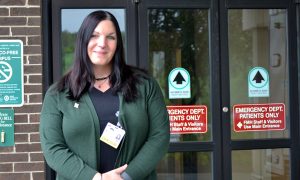
FARMINGTON – Franklin Memorial Hospital (FMH) joined the MaineHealth Telestroke Network (MTN) last September offering expert stroke coverage 24/7, improving patient outcomes and decreasing stroke-related disability, all while keeping the patient close to home.
Using two-way videoconferencing and electronic transfer of CT scans, Telestroke is a way for specially-trained doctors at Maine Medical Center (MMC) to evaluate, diagnose and make treatment plans for patients at Franklin Memorial Hospital where a stroke expert is not available.
Shortly after its September implementation, the first successful MTN consult occurred. Since then there have been 24 consult requests from FMH, four of which resulted in thrombolytic (tPA) being given. tPA works to dissolve the clot and improve blood flow to the part of the brain being deprived of blood flow.
According to Brian Chipman, program manager MMC Telestroke, “FMH already had a robust stroke treatment process in place so the integration of TeleStroke was easy and seamless, adding that FMH currently has the fastest door-to-CT times across the TeleStroke system.”
The best treatment for a stroke is to stop it while it is happening. The longer a patient waits for treatment, the more damage there may be to the brain. For this reason, the MTN system works to speed up stroke diagnosis and treatment. As a result of close collaboration between the stroke program, partner emergency departments and state-wide stroke initiatives, more patients are able to receive stroke care within the three-hour window needed for tPA administration.
“Telestroke implementation has allowed us to access neurologists who are the experts in stroke care in a rapid manner. They provide a thorough examination of the patient, review the records, converse with patients and families regarding risks and expected benefits of proposed treatments and give input to the decision making process,” said Jodi Conrad, DO, FMH Emergency Department medical director and provider.
Dr. Conrad added, “Having the Telestroke program ensures the best possible outcomes for our patients who suffer from acute stroke. The program also ensures quicker access to transfer to MMC, ensuring care for those patients who may have indications for other neurological interventions.”
Learn to recognize the signs and symptoms of a stroke. Call 9-1-1 or seek emergency medical care right away if you or someone you know has any of the following symptoms: facial drooping; arm weakness; one side of the body feels weak or numb; loss of balance, feeling dizzy; sudden severe headache; trouble seeing out of one or both eyes; or speech difficulties.




